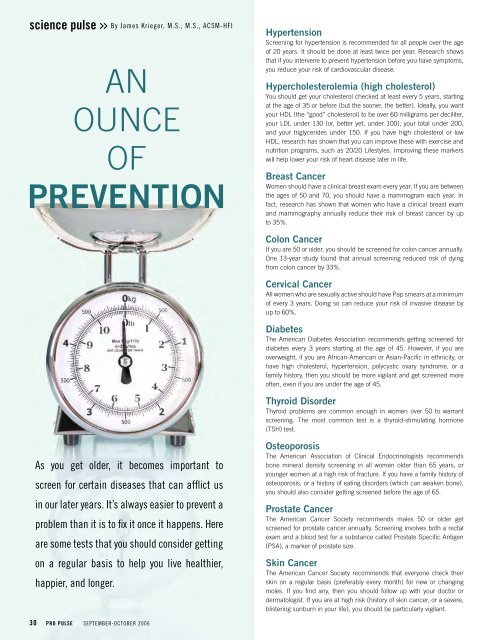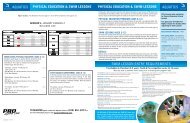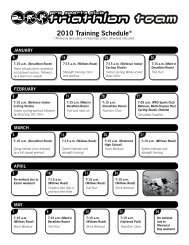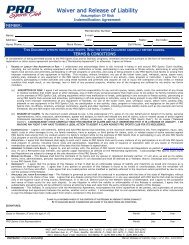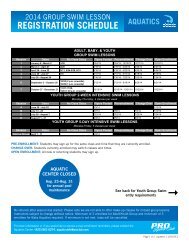online edition - PRO Sports Club
online edition - PRO Sports Club
online edition - PRO Sports Club
- No tags were found...
Create successful ePaper yourself
Turn your PDF publications into a flip-book with our unique Google optimized e-Paper software.
science pulseBy James Krieger, M.S., M.S., ACSM-HFIANOUNCEOFPREVENTIONHypertensionScreening for hypertension is recommended for all people over the ageof 20 years. It should be done at least twice per year. Research showsthat if you intervene to prevent hypertension before you have symptoms,you reduce your risk of cardiovascular disease.Hypercholesterolemia (high cholesterol)You should get your cholesterol checked at least every 5 years, startingat the age of 35 or before (but the sooner, the better). Ideally, you wantyour HDL (the “good” cholesterol) to be over 60 milligrams per deciliter,your LDL under 130 (or, better yet, under 100), your total under 200,and your triglycerides under 150. If you have high cholesterol or lowHDL, research has shown that you can improve these with exercise andnutrition programs, such as 20/20 Lifestyles. Improving these markerswill help lower your risk of heart disease later in life.Breast CancerWomen should have a clinical breast exam every year. If you are betweenthe ages of 50 and 70, you should have a mammogram each year. Infact, research has shown that women who have a clinical breast examand mammography annually reduce their risk of breast cancer by upto 35%.Colon CancerIf you are 50 or older, you should be screened for colon cancer annually.One 13-year study found that annual screening reduced risk of dyingfrom colon cancer by 33%.Cervical CancerAll women who are sexually active should have Pap smears at a minimumof every 3 years. Doing so can reduce your risk of invasive disease byup to 60%.DiabetesThe American Diabetes Association recommends getting screened fordiabetes every 3 years starting at the age of 45. However, if you areoverweight, if you are African-American or Asian-Pacific in ethnicity, orhave high cholesterol, hypertension, polycystic ovary syndrome, or afamily history, then you should be more vigilant and get screened moreoften, even if you are under the age of 45.Thyroid DisorderThyroid problems are common enough in women over 50 to warrantscreening. The most common test is a thyroid-stimulating hormone(TSH) test.As you get older, it becomes important toscreen for certain diseases that can afflict usin our later years. It’s always easier to prevent aproblem than it is to fix it once it happens. Hereare some tests that you should consider gettingon a regular basis to help you live healthier,happier, and longer.OsteoporosisThe American Association of Clinical Endocrinologists recommendsbone mineral density screening in all women older than 65 years, oryounger women at a high risk of fracture. If you have a family history ofosteoporosis, or a history of eating disorders (which can weaken bone),you should also consider getting screened before the age of 65.Prostate CancerThe American Cancer Society recommends males 50 or older getscreened for prostate cancer annually. Screening involves both a rectalexam and a blood test for a substance called Prostate Specific Antigen(PSA), a marker of prostate size.Skin CancerThe American Cancer Society recommends that everyone check theirskin on a regular basis (preferably every month) for new or changingmoles. If you find any, then you should follow up with your doctor ordermatologist. If you are at high risk (history of skin cancer, or a severe,blistering sunburn in your life), you should be particularly vigilant.30 <strong>PRO</strong> PULSE SEPTEMBER-OCTOBER 2006


